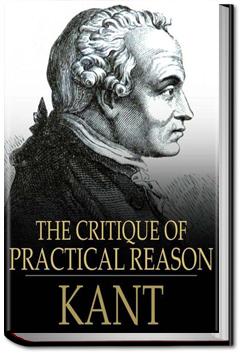UNLIMITED Audiobooks and eBooks
Over 40,000 books & works on all major devices
Get ALL YOU CAN for FREE for 30 days!
The Critique of Practical Reason
Immanuel Kant
Book Overview:
The Critique of Practical Reason is the second of Immanuel Kant’s three critiques, first published in 1788. It follows on from his Critique of Pure Reason and deals with his moral philosophy. The second Critique exercised a decisive influence over the subsequent development of the field of ethics and moral philosophy, becoming the principle reference point for ethical systems that focus on the rightness or wrongness of actions themselves, as opposed to the rightness or wrongness of the consequences of those actions. Subsequently termed “deontological ethics”, Kant’s ethical system also laid the groundwork of moral absolutism, the belief that there are absolute standards against which moral questions can be judged, and that certain actions are right or wrong, devoid of the context of the act.
The Critique of Practical Reason is the second of Immanuel Kant’s three critiques, first published in 1788. It follows on from his Critique of Pure Reason and deals with his moral philosophy. The second Critique exercised a decisive influence over the subsequent development of the field of ethics and moral philosophy, becoming the principle reference point for ethical systems that focus on the rightness or wrongness of actions themselves, as opposed to the rightness or wrongness of the consequences of those actions. Subsequently termed “deontological ethics”, Kant’s ethical system also laid the groundwork of moral absolutism, the belief that there are absolute standards against which moral questions can be judged, and that certain actions are right or wrong, devoid of the context of the act.
How does All You Can Books work?
All You Can Books gives you UNLIMITED access to over 40,000 Audiobooks, eBooks, and Foreign Language courses. Download as many audiobooks, ebooks, language audio courses, and language e-workbooks as you want during the FREE trial and it's all yours to keep even if you cancel during the FREE trial. The service works on any major device including computers, smartphones, music players, e-readers, and tablets. You can try the service for FREE for 30 days then it's just $19.99 per month after that. So for the price everyone else charges for just 1 book, we offer you UNLIMITED audio books, e-books and language courses to download and enjoy as you please. No restrictions.
Try now for FREE!

"Love your service - thanks so much for what you do!"
- Customer Cathryn Mazer
"I did not realize that you would have so many audio books I would enjoy"
- Customer Sharon Morrison
"For all my fellow Audio Book & E-Book regulars:
This is about as close to nirvana as I have found!"
- Twitter post from @bobbyekat



Community Reviews
Immanuel Kant is what I suppose one would call a 'practical philosopher' in that he is not primarily concerned with the more abstract thoughts of philosophy. Rather his philosophy, as expressed in this book, is one about how practical philosophy, or practical reason, works. He makes a distinction at
Hume, by his criticism of the concept of causality, awakened him from his dogmatic slumber—so at least he says, but the awakening was only temporary, and he soon invented a soporific that enabled him to sleep again.
—Bertrand Russell, A History of Western Philosophy
When I first read that opening sa
Ο Immanuel Kant είναι ένας κολοσσός της διανόησης του Δυτικού Πολιτισμού. Ηθικολόγος και ορθολογιστής, έδωσε νέα κατεύθυνση στην Ευρωπαϊκή φιλοσοφία. Η «Κριτική του πρακτικού Λόγου» (1788) αποτελεί ουσιαστικά τη βάση της καντιανής ηθικής. Όλο το έργο συνοψίζεται στην προσταγή: «Πράττε έτσι, ώστε ο γ
The Sequel is even better!
The first two critiques constitue a unit so far as their main argument goes. The Critique of Pure Reason establishes that while humans can imagine things in themselves (ideas), they can only know things as they are given to them (concepts). The gap between our conceptional understanding and our rati
The question that practical reason asks us is, what ought I to do? In this book Kant offers his analysis of how pure reason, which relies on no empirical input whatsoever, can help us answer that question.
As a follow up to Critique of Pure Reason, this book is a grave disappointment. Altogether aba
Το βιβλίο αυτό με δυσκόλεψε περισσότερο από άλλα που έχω διαβάσει όχι λόγω νοημάτων, όσο λόγω της ξύλινης γλώσσας που θυμίζει νομικούς κώδικες. Επέμεινα όμως σ' αυτό, περισσότερο απ' ότι έχω κάνει με άλλα στο παρελθόν, κυρίως επειδή θεωρώ φίλο το Σοπενάουερ και ως τώρα οι ''συμβουλές'' του με βοήθησ